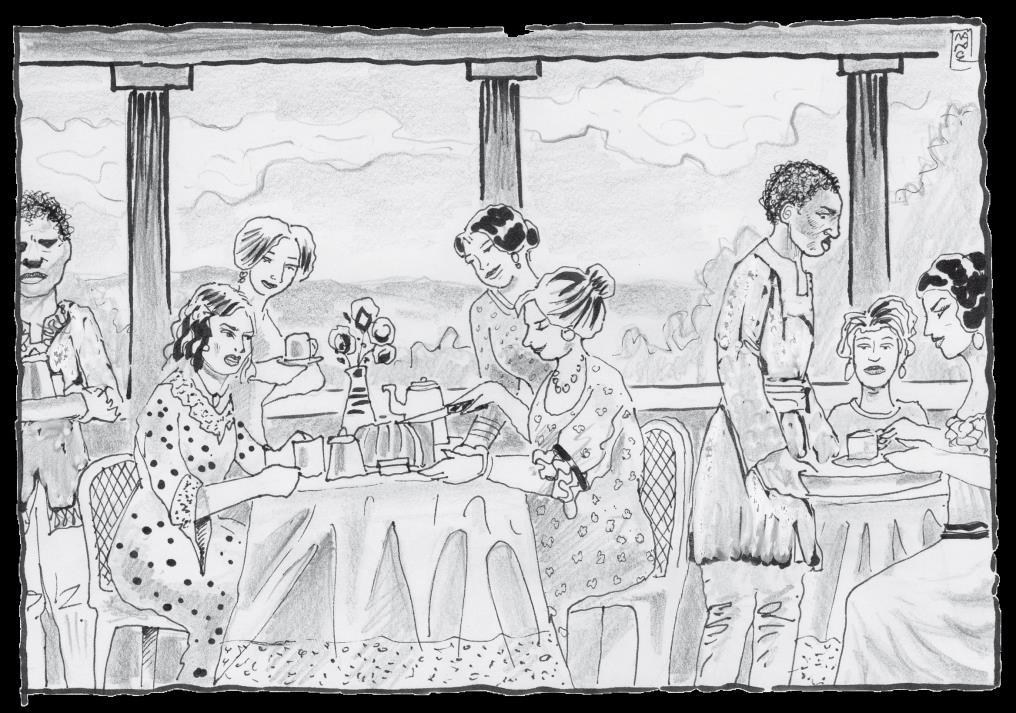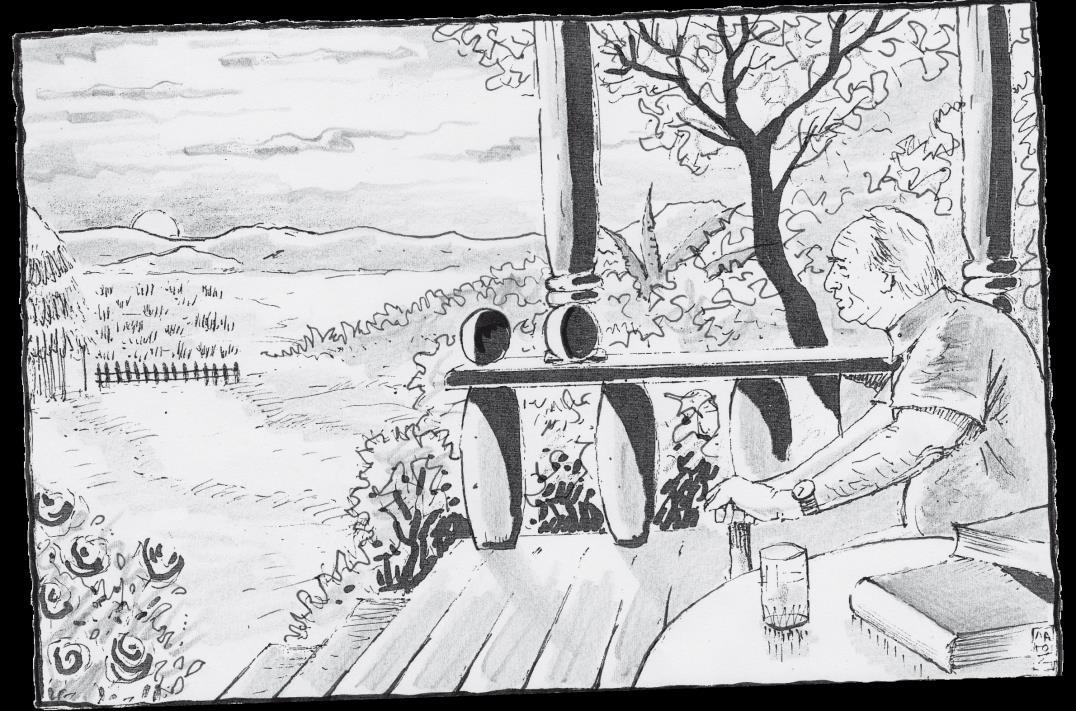
5 minute read
Chapter Nine
Invitation to Tea
Sometimes my grandmother was too busy to pay much attention to me and this was a golden opportunity for me to escape to seek adventure on my bike. However, I remember that once I decided to stay at home to observe the preparations for a tea party, while pretending to play with my toy cars and soldiers.
Advertisement
Grandma got the servants to clean the entire house and to pay particular attention to the large verandah, which had a view of the front garden and beyond to the vast estate. From one side of the verandah you could see Mt Meru and, further off, Mt Kilimanjaro, and from the other side you could watch the sun set over the savannah.
There was chaos in the kitchen from very early in the morning. Sabani and my grandmother were busy baking cakes and cookies and washing and peeling mangos, pineapples and papayas. On that day we ate lunch earlier than usual, at noon, in the large kitchen. As soon as we had finished eating, the servants started to lay the tables on the verandah with snowy-white tablecloths and napkins. Vases of flowers freshly cut from the garden were placed on each table. Servants rushed about with trolleys loaded with dishes, cups and cutlery. There was such a hubbub! And at the heart of all this hectic activity: my grandmother giving orders.
Once everything was ready, grandma retired to her room to get dressed. I followed her. She needed to smarten up before the guests arrived. Sitting at her dressing table looking in the mirror, she put lipstick on her lips. I was amused at the peculiar expressions on her face, as she stretched and rubbed her lips together to spread the lipstick evenly. She then used her finger to spread the excess on her cheeks in order to make them ‘rosier’, in her own words. Then she would press a piece of paper between her lips. I studied the paper and was struck by the shape of the lips that were imprinted on it. Grandma told me that it was a kiss. She looked different; more beautiful. She combed her hair and put a hat on, which she pinned in position on her head. ‘Grandma, you’re very beautiful, so why not dress up every day?’ I asked. ‘My dear boy, I haven’t got time to primp myself up every day, what with all the work there is to do in the house. Today is a special day; I’ve invited all these people to tea, and I must look nice for the other ladies!’
Punctually, at three p.m., the guests started to arrive from the neighbouring farms: ladies from Italy, Britain and France, as well as Greek ladies who were from Smyrna, like my grandmother. They all wore very colourful dresses and (to me) strange hats, and were heavily perfumed, all with painted faces and wide smiles and a lot of noisy chatter. Grandma was a perfect hostess and she welcomed all the ladies with handshakes and kisses on the cheek. Each lady was brought by a driver from their estate, and they came in Land Rovers or other farm vehicles. They didn’t bring their husbands, who claimed not to be able to take time off from running their estates.
Once everyone was seated, the servants came with tea, coffee, milk, sugar, impressive tiered cake trays loaded with delicious sweets and cookies and great platters of tropical fruit. Conversation was in a variety of languages: Greek, Italian, French, English, and Swahili my grandmother even spoke to her compatriots in Turkish! My grandmother and her sisters had grown up in a cosmopolitan environment in Smyrna and knew many foreign languages. My grandmother spoke fluent French, Italian and Turkish, though her English was not very good. Colonial Africa provided a cosmopolitan environment, to which my grandmother adjusted with ease.
Chapter Ten
The Verandah at dusk
The verandah was always shady during the day and so it was the hub of social life on the estate. It was very pleasant in the afternoon to sit in the cool, to contemplate the scenery and enjoy the view. My grandfather liked to relax on the verandah before sunset, reading or listening to opera, which he loved, on the gramophone.
In East Africa the sunset is indeed an amazing experience. Because Tanzania is on the equator, daylight lasts for a full twelve hours throughout the year. The sun rises at six a.m. and sets at six p.m. I remember I was in bed and asleep by seven; it was already dark by then. The rest of the family went to bed between nine and ten at night and got up before dawn, at five in the morning.
My grandfather was a busy man. He worked on the estate throughout the day with just a short break for lunch. He and my grandmother got up early every day and they would sit in the kitchen chatting while they had breakfast. Grandma made Greek coffee (grown on the estate) and a full breakfast of porridge with honey, fried egg and tropical fruits. As I lay half-asleep in bed, I would hear the Land Rover starting up. It was six a.m. and grandpa was off to work.
I didn’t have much to do with my grandfather he was just too busy. He was a taciturn, intelligent man who respected everyone, no matter their origins. He was a Greek born and raised in Egypt. By 1921 he had already bought land in what was then Tanganyika, which until 1918 was a German colony and then became British territory at the end of the First World War.
On some afternoons, which were really few and far between, he would lift me onto his lap and, to the accompaniment of operatic arias on the gramophone, he would tell me about Egypt and the Nile enchanting stories peppered with Arabic words to impress me. He adored opera and his favourite was Madame Butterfly by Puccini. Sometimes he was so moved by the music that I saw his eyes brim with tears. I often fell asleep on his lap, with my head on his chest, while he quietly hummed or sang the arias. He would then carry me to bed, followed by my grandmother who would disturb my slumber to make sure I brushed my teeth and washed before going to bed.
Dusk brought magic to the verandah. We watched the fading colours of the landscape and saw the sky, which in Africa is vast, changing from light blue to yellow and then red as the sun cast its last rays of light. And the clouds looked almost black, like smoke, their edges catching fire. When the sun finally sank into the horizon and disappeared, it was as if a switch was flipped, and for the few seconds of twilight there was absolute silence as darkness took over the land. With the darkness came the chorus of sounds that declared that the wilderness was coming to life.
The night is alive: hear the hum of insects, the growl of lions, the crazed laughter of hyenas as a cool breeze caresses your face. Night does not sleep; it is vibrant and alive.











